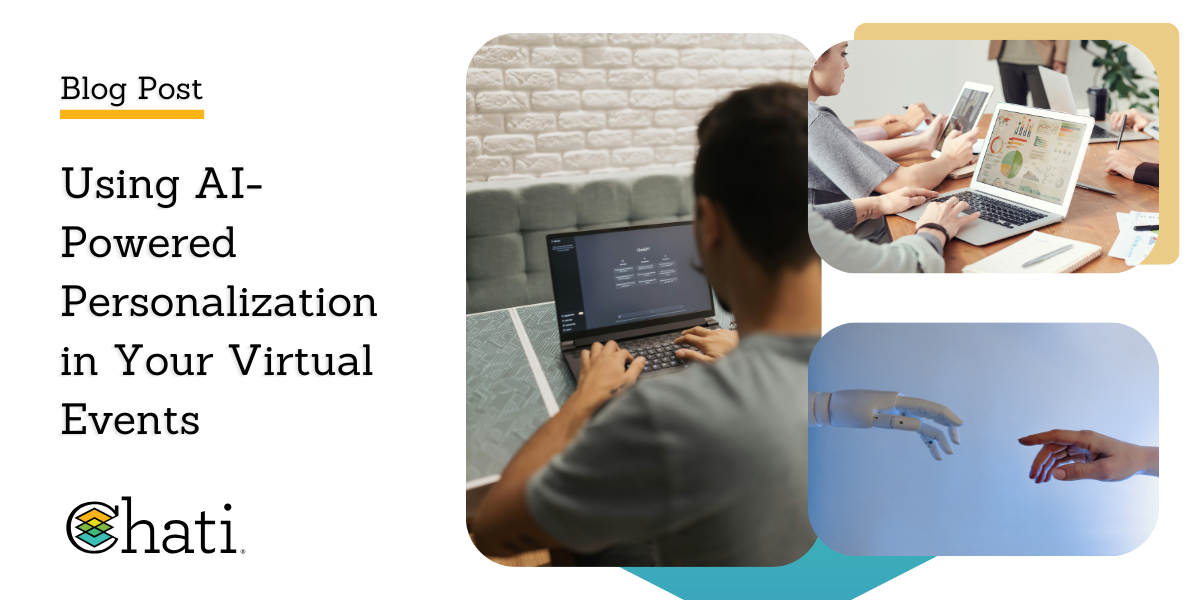Virtual events enable audiences worldwide to engage and connect while striving to achieve their personal and professional goals. Artificial intelligence (AI) is playing an increasingly vital role in the virtual events industry, transforming how organizers plan, manage, and deliver experiences. One of AI’s most powerful contributions is enabling personalized interactions, which are essential for boosting attendee engagement and improving retention by catering to individual preferences and behaviors.
Here, we will discuss how AI-based personalization can be used to enhance virtual events, including why it matters, personalization strategies, measuring success, challenges, and more. Through this, you will have the tools and resources to use AI for enhancing your virtual event experience for everyone.
Why AI-Powered Personalization Matters

Traditional personalization in virtual events has often been limited by manual processes, generic content, and a lack of real-time insights, making it difficult to tailor experiences for large and diverse audiences effectively. AI overcomes these challenges by rapidly analyzing data to deliver content that is more relevant, timely, and accurate for each attendee. This not only enhances individual satisfaction by meeting specific interests and needs but also significantly boosts overall event ROI by increasing engagement, participation, and long-term value.
Top Personalization Strategies Powered by AI

1. Smart Agenda Recommendations
AI curates personalized event schedules by analyzing user interests, past behavior, and real-time interactions to recommend sessions that align with each attendee’s preferences. This intelligent scheduling leads to higher session attendance. It encourages participants to stay engaged for more extended periods, as they are more likely to find content that is relevant and compelling to them.
2. Dynamic Content Curation
AI enables event platforms to deliver tailored content—such as videos, resources, and sessions—to different attendees based on their profiles and interactions. This dynamic delivery ensures each participant receives the most relevant and valuable information, enhancing their overall experience.
3. AI-Driven Networking Suggestions
AI enhances virtual networking by intelligently matching attendees based on job roles, shared interests, or behavior patterns observed during the event. This targeted approach powers features like speed networking, personalized 1:1 matchmaking, and timely follow-up reminders, making interactions more relevant and impactful. As a result, attendees are more likely to form valuable connections, contributing to a more prosperous and more productive event experience.
4. Behavior-Based Notifications
AI-driven automated nudges and reminders, triggered by attendee actions such as abandoned sessions or periods of inactivity, play a key role in maintaining engagement throughout virtual events. By delivering timely prompts tailored to user behavior, these real-time interventions help re-engage participants, guiding them back to relevant sessions or content and ensuring a smoother, more continuous experience.
5. Personalized Exhibit Hall Experiences
AI enhances virtual exhibitor booths by tailoring content, product displays, and interactions to each visitor’s profile, including their interests, industry, and past behavior. This personalized approach captures attendee attention more effectively, resulting in more extended booth visits and higher-quality leads. For sponsors and exhibitors, this means increased visibility, more meaningful engagements, and a more substantial return on investment.
Best Tools & Platforms for AI Personalization in Events

Leading virtual event platforms like Swapcard, Chati, Webex Events, and ON24 are integrating advanced AI capabilities to enhance user experiences and event performance. These platforms offer powerful features such as real-time analytics to track engagement, audience segmentation for targeted content delivery, and recommendation engines that personalize sessions and networking opportunities. Together, these tools help organizers create smarter, more dynamic events that drive deeper engagement and better outcomes.
Measuring the Success of AI Personalization

Tracking key metrics such as engagement rates, content views, networking interactions, and satisfaction scores provides valuable insights into attendee behavior and preferences. By analyzing this post-event data, organizers can refine personalization strategies for future events, delivering more targeted content, improving matchmaking, and enhancing overall user experience. This continuous feedback loop helps drive greater engagement and higher ROI over time.
Challenges and Considerations

As AI personalization becomes more prevalent in virtual events, it’s essential to address privacy and ethical considerations surrounding data collection and usage. Ensuring transparent data practices and offering opt-in experiences helps build trust with attendees while respecting their autonomy. Striking the right balance between automated personalization and the human touch is also key, leveraging AI to enhance, not replace, authentic, meaningful interactions.
Summary
Here, we discussed how AI-based personalization can be used to enhance virtual events, including why it matters, personalization strategies, measuring success, challenges, and more. Through this, you now have the knowledge to use AI personalization for enhancing your virtual event experience for audiences worldwide while helping them achieve their personal and professional goals.

We encourage event organizers to experiment with at least one AI-based personalization strategy in their next virtual event to enhance engagement and overall experiences. Please contact Chati to explore how AI-powered tools can deliver smarter, more engaging virtual event experiences for everyone.
